
- Understanding Oral Hygiene Maintenance and Its Importance
- The Role of Mouthwash in Oral Care: More Than Just Fresh Breath
- Criteria for Choosing the Best Mouthwash for Oral Hygiene Maintenance
- Popular Types of Mouthwash and Their Specific Benefits
- Real-Life Examples of Mouthwash Impact on Oral Health
- Professional Advice and Recommendations for Using Mouthwash Effectively
1. Understanding Oral Hygiene Maintenance and Its Importance
Oral hygiene maintenance goes far beyond just brushing your teeth twice a day. It is a comprehensive routine that protects your mouth, teeth, gums, and overall health. Neglecting proper oral care can lead to a cascade of problems including bad breath, cavities, gum disease, and even systemic health issues like heart disease or diabetes. Maintaining oral hygiene requires the combined use of various products and habits—brushing, flossing, diet control, and importantly, the use of mouthwash.
Many people underestimate the significance of mouthwash, viewing it as a cosmetic add-on rather than a key player in oral hygiene. However, the best mouthwash for oral hygiene maintenance serves as a vital adjunct to brushing and flossing by reducing harmful bacteria, preventing plaque buildup, and refreshing breath in ways traditional methods cannot fully achieve alone.
2. The Role of Mouthwash in Oral Care: More Than Just Fresh Breath
Mouthwash can be a powerful ally in your oral hygiene routine when used correctly. It complements mechanical cleaning by reaching areas that brushing and flossing may miss, such as the back of the tongue and deep gum pockets. The active ingredients in mouthwash help reduce oral bacteria responsible for plaque, gingivitis, and bad breath.
Additionally, some formulations include fluoride, which strengthens tooth enamel and helps prevent decay. Antimicrobial mouthwashes target specific bacteria, reducing the risk of periodontal disease, while therapeutic mouthwashes can alleviate dry mouth symptoms, a common issue that can exacerbate dental problems.
Understanding these benefits highlights why choosing the right mouthwash is crucial. It's not just about feeling minty fresh—it’s about maintaining long-term oral health.
3. Criteria for Choosing the Best Mouthwash for Oral Hygiene Maintenance
Choosing the best mouthwash involves evaluating several important factors beyond just flavor or brand popularity. Here’s a detailed breakdown:
3.1 Ingredients and Their Functions
Look for mouthwashes containing antimicrobial agents like chlorhexidine, cetylpyridinium chloride, or essential oils, which reduce harmful bacteria. Fluoride is essential for cavity prevention. Avoid products with high alcohol content if you have sensitive gums or suffer from dry mouth.
3.2 Purpose and Personal Oral Health Needs
Different mouthwashes serve different purposes—some focus on freshening breath, others on tartar control, and some on gum health. Understanding your specific needs—whether it’s preventing cavities, managing gingivitis, or combating bad breath—will guide your choice.
3.3 Safety and Recommendations
Consult with dental professionals to ensure the mouthwash is safe for daily use, especially for children, pregnant women, or individuals with oral sensitivities. Professional guidance helps avoid misuse or over-reliance on mouthwash as a sole oral care method.
4. Popular Types of Mouthwash and Their Specific Benefits
4.1 Cosmetic Mouthwash
Primarily targets bad breath and provides a temporary fresh feeling. However, it doesn’t significantly reduce plaque or gingivitis.
4.2 Therapeutic Mouthwash
Contains active ingredients that control or reduce conditions like gingivitis, plaque, tooth decay, and bad breath. For example, mouthwashes with chlorhexidine are often prescribed for gum disease treatment.
4.3 Fluoride Mouthwash
Enhances enamel protection, reduces cavities, and is ideal for people prone to tooth decay.
4.4 Natural Mouthwash
Uses essential oils and herbal extracts to provide antimicrobial effects without synthetic chemicals, appealing to those seeking holistic options.
5. Real-Life Examples of Mouthwash Impact on Oral Health
A popular case illustrating the effectiveness of mouthwash comes from a recent community health initiative in which participants incorporated therapeutic mouthwash into their daily routine. Over six months, dental check-ups revealed a 40% reduction in gingivitis symptoms and a significant decrease in plaque buildup compared to the control group using brushing alone.
Another personal story comes from a user suffering chronic bad breath despite rigorous brushing and flossing. After switching to an antimicrobial mouthwash recommended by their dentist, they noticed a dramatic improvement in breath freshness and gum health within weeks, boosting their confidence in social situations.
Such examples underscore that the best mouthwash for oral hygiene maintenance is not a one-size-fits-all product but a well-chosen tool that complements personal oral care habits.
6. Professional Advice and Recommendations for Using Mouthwash Effectively
Dental experts emphasize that mouthwash should never replace brushing or flossing but rather enhance these fundamental practices. Use it after brushing for about 30 seconds to 1 minute, and avoid eating or drinking immediately afterward to maximize its effects.
For those uncertain about which mouthwash suits their needs, Dentistry Toothtruth offers expert guidance and a curated selection of the best mouthwashes tailored to various oral health concerns. Whether you seek cavity protection, gum disease prevention, or natural oral care products, they provide trusted advice and high-quality options to help maintain your oral hygiene effectively.
Remember, oral health is a long-term commitment. Combining the best mouthwash for oral hygiene maintenance with a consistent daily routine leads to healthier teeth, fresher breath, and a confident smile.







 Grand Avenue Dental Center4.0 (422 review)
Grand Avenue Dental Center4.0 (422 review) Desert Ridge Periodontics & Implant Dentistry4.0 (61 review)
Desert Ridge Periodontics & Implant Dentistry4.0 (61 review) Gregg W Jepson DMD5.0 (7 review)
Gregg W Jepson DMD5.0 (7 review) Maya Dental3.0 (6 review)
Maya Dental3.0 (6 review) Fawcett Tod R DDS5.0 (9 review)
Fawcett Tod R DDS5.0 (9 review) Raleigh Periodontics and Implant Dentistry5.0 (179 review)
Raleigh Periodontics and Implant Dentistry5.0 (179 review) The Importance of Oral Health Education During Pregnancy for a Healthy Pregnancy
The Importance of Oral Health Education During Pregnancy for a Healthy Pregnancy Best Tips for Brushing Your Teeth Properly for Healthy Gums: Essential Techniques for Oral Health
Best Tips for Brushing Your Teeth Properly for Healthy Gums: Essential Techniques for Oral Health Why Skipping Dental Checkups Can Lead to Bigger Oral Health Problems
Why Skipping Dental Checkups Can Lead to Bigger Oral Health Problems Advantages of Porcelain Dental Restorations
Advantages of Porcelain Dental Restorations How Can Diabetes Cause Tooth and Gum Problems? Preventing and Managing Oral Health Issues
How Can Diabetes Cause Tooth and Gum Problems? Preventing and Managing Oral Health Issues Healthy Habits for Promoting Good Oral Health and Hygiene: Tips for a Healthy Smile
Healthy Habits for Promoting Good Oral Health and Hygiene: Tips for a Healthy Smile